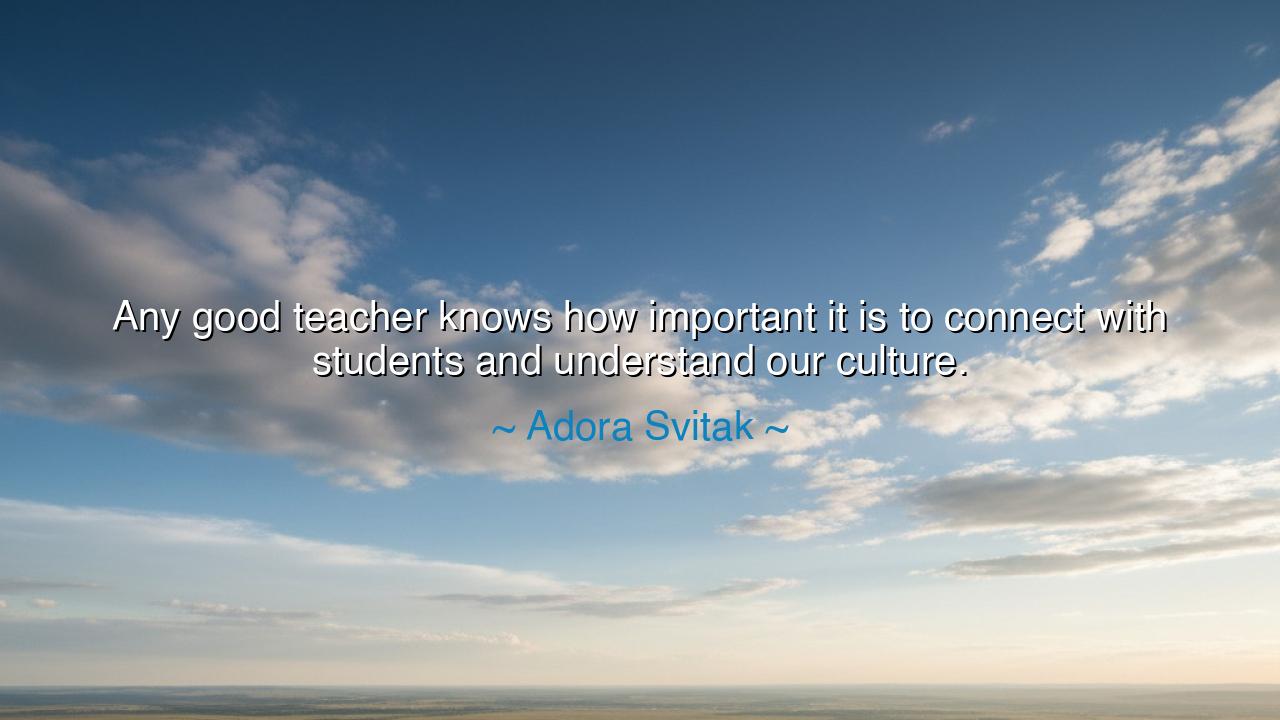
Any good teacher knows how important it is to connect with
Any good teacher knows how important it is to connect with students and understand our culture.






Hear the words of Adora Svitak, spoken with the clarity of youth yet carrying the wisdom of ages: “Any good teacher knows how important it is to connect with students and understand our culture.” In this statement lies the essence of teaching as more than the transfer of knowledge — it is the weaving of bonds, the building of trust, the act of stepping into another’s world to guide them forward. For without connection, knowledge becomes a cold stone; but when joined with understanding, it becomes fire, warm and alive.
The origin of these words rests in Svitak’s own story, a child prodigy who spoke not only as a student but as one who had felt the weight of expectations and the hunger for true connection. She saw what many adults forget: that learning is not a one-way command, but a dialogue. A teacher who does not seek to know the culture of their students speaks into the air, but a teacher who listens, who understands the lives, struggles, and dreams of their pupils, speaks directly into their souls.
The meaning is deeply emotional: teaching is relationship. A teacher may have wisdom vast as a library, but if they do not connect with their students, their words will fall on barren ground. Yet when a teacher looks into the heart of a child, when they honor their background, their family, their culture, then the soil becomes fertile. Knowledge takes root. Respect blossoms. Learning becomes not an imposition, but a shared journey.
History is filled with examples of this truth. Consider the story of Booker T. Washington, who founded the Tuskegee Institute to uplift newly freed African Americans. He knew that to truly teach, he could not ignore the culture and struggles of his students. He connected with their experiences of poverty and hardship, shaping lessons that honored their reality while guiding them toward dignity and self-sufficiency. In this way, Washington’s teaching was not only instruction but liberation. His greatness lay not merely in knowledge, but in connection.
So too did Confucius understand that culture is the soil of learning. He taught not abstractly, but in the context of ritual, tradition, and the living practices of the people. By respecting the culture of his time while also refining it, he forged a system of teaching that endured for centuries. Thus, from East to West, from ancient days to modern ones, the truth resounds: without understanding culture, there can be no true education.
The lesson for us is clear and timeless: if we wish to guide others, we must first walk beside them. If we wish to shape minds, we must first honor the worlds in which those minds live. Connection is not weakness but strength, for it builds the bridge by which truth may travel. To ignore culture is to speak into silence; to embrace it is to awaken hearts.
Therefore, take these practical actions: If you are a teacher, learn the names, stories, and traditions of your students. If you are a leader, listen before you speak, for only by understanding the culture of your people can you guide them well. If you are a parent, a mentor, or a friend, remember that your wisdom must always be clothed in compassion, shaped by the life of the one you love. In every role, let connection be the foundation of instruction.
So remember the words of Adora Svitak: “Any good teacher knows how important it is to connect with students and understand our culture.” Let this truth echo across generations. For to connect is to care, and to understand is to honor. Only then can teaching rise from mere words to become transformation, shaping not only minds but souls, and leaving a legacy that endures beyond the classroom and into eternity.






AAdministratorAdministrator
Welcome, honored guests. Please leave a comment, we will respond soon